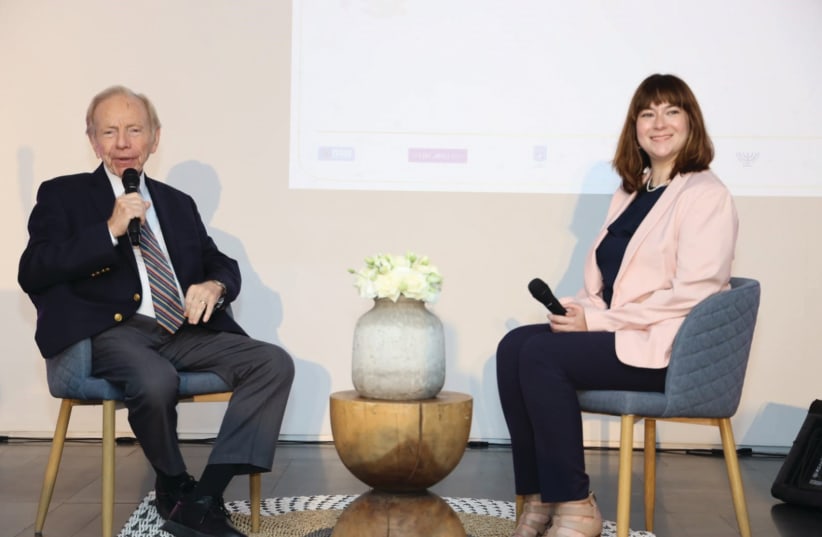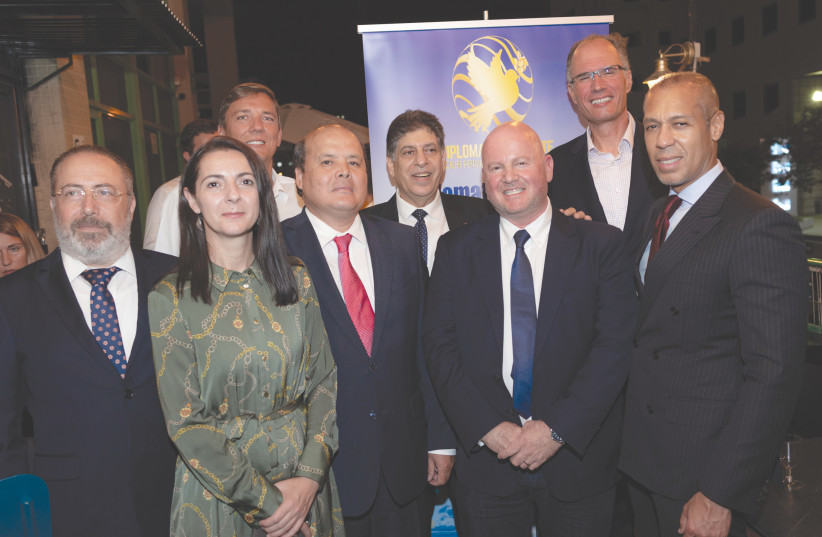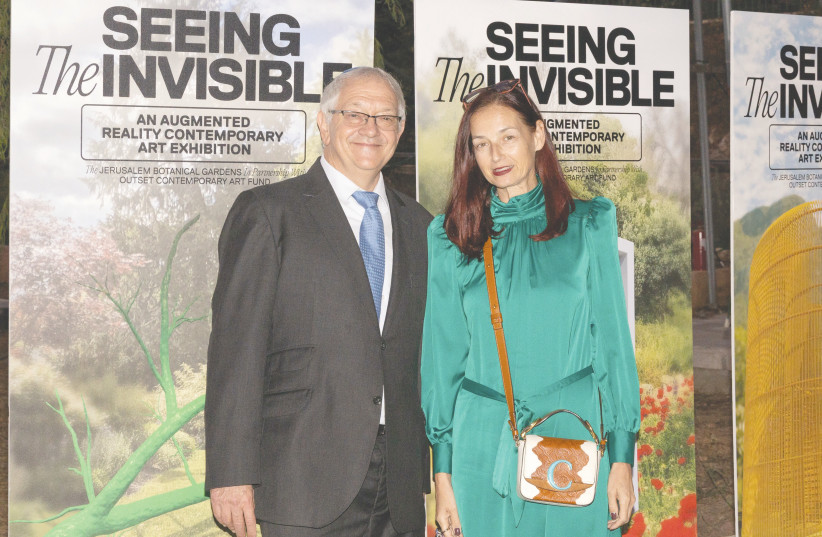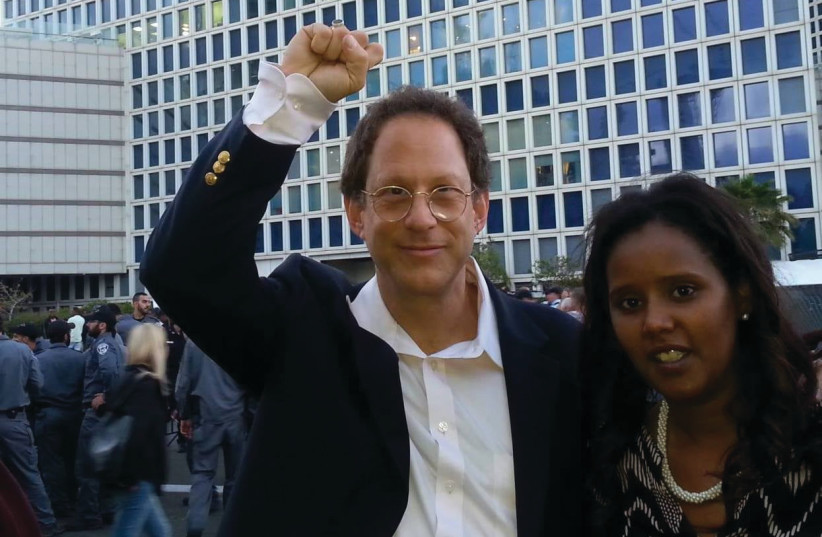‘I’m greatly troubled by the Biden administration’s attitude to Iran. The leadership of Iran is extremely extreme, and I don’t understand how any administration would make a deal with them and believe they would keep the deal.”
The speaker was not a minister in the Israeli government, but former Democratic senator from Connecticut Joe Lieberman, who was responding to a question put to him by Jerusalem Post diplomatic correspondent Lahav Harkov.
The occasion was the opening night of the First Israeli Conference, of Shabbat Unplugged, on Shabbat, Society and Economy. It was also the Hebrew Launch of Lieberman’s book The Gift of Rest: Rediscovering the Beauty of the Sabbath. The Hebrew version, under the title of Zman Shabbat, has a slightly different connotation.
The book was published by Maggid Books with a foreword by Dr. Ruth Kabbesa-Abramzon, the CEO of the nonprofit organization Shearim and the founder of Shabbat Unplugged, which finds some kind of common denominator in the diversity of all the ways in which people relate to Shabbat. It was at her initiative that the book was translated into Hebrew.
The conference was held at the ANU Museum in Tel Aviv. Lieberman is the honorary international chairman of the museum’s board of governors, so he was actually present in a dual capacity.
Harkov had been asked to interview him about the book, but as a diplomatic correspondent and former Knesset reporter, she could not shy away from the Iran issue.
Lieberman, who has no faith in anything to which Iran might agree, is hopeful that US President Joe Biden has a plan B to stop Iran from further developing its nuclear capability. He sees a nuclear Iran as a threat to world security, to American security, to Israeli security and to Arab security.
He is also disturbed by the eight Democrats and one Republican who voted against further funding for the Iron Dome. “The voices of these nine were more stridently opposed to Israel than ever before,” he lamented, declaring that they were acting on false premises. He suggested that the Israeli government should try to get them to come to Israel.
He found it ludicrous that the nine should call Israel a colonial power when it was a colonial power that the Jews fought in order to gain Israel’s independence. He also scoffed at the idea of calling Israel racist “when half the population would be called people of color.”
As for the book, Lieberman told Harkov that he wrote the book in order to answer all the questions that both Jews and non-Jews asked him about being a Sabbath-observant elected official. The non-Jews actually had more respect than the nonobservant Jews.
“I love Shabbat,” he said. “Shabbat is a gift. I wanted, in my non-rabbinic way, to do a little kiruv (outreach).” Now he hopes that the Hebrew edition will enable him to do a little kiruv in Israel as well.
Numerous figures from different walks of life attended the opening, and although every speaker waxed eloquent over the different elements of Shabbat, very few of the men who were present wore kippot, and hardly any of the women covered their hair. Of the men, the one who stood out was Ashkenazi Chief Rabbi David Lau, who, emulating his father, Rabbi Israel Meir Lau, wore a black fedora and a black frock coat.
On the subject of Shabbat, Kabbesa-Abramzon said “Shabbat is not just a time factor, but an experience.”
Irina Nevzlin, who chairs the museum’s board of directors and is president of the Nadav Foundation, said: “We want to give the younger generation of Jews a feeling of pride in being Jewish.”
Incidentally, Nevzlin is one of the contenders for the chairmanship of the Jewish Agency, and her husband, MK Yuli Edelstein, a former minister and Knesset speaker, has announced that he is contending for the Likud leadership and ultimately the prime ministership of Israel.
Nevzlin noted that, throughout his political life, Lieberman “never forgot that he’s Jewish and took pride in his Jewishness.”
Former Police commissioner Roni Alsheich regretted that so many people no longer say “Shabbat shalom” but prefer to say “Have a nice weekend.” Shabbat unites the individual to the family, and the family to the community, he stated.
Chief Rabbi Lau suggested that Shabbat is a good time for developing human relationships. Mobile phones should be closed and put away, and instead of addressing the screen, people should be engaged in more direct conversations with each other. “We talk about each other in Israel, and not with each other. We need to talk to each other instead of communicating through an electronic device,” he said.
Over the past 70 years, the status quo in relation to religion and state has changed and keeps changing – sometimes with the help of the Supreme Court, said Religious Services Minister Matan Kahana.
Moreover, attempts to ensure public respect for the Sabbath have failed, said Kahana, citing alternate transport services on Shabbat, which in this regard becomes just another day in the week.
He stressed the importance of Shabbat becoming relevant and meaningful to everyone, regardless of how each person opts to observe it. People can’t be forced to change their beliefs or way of life, he said, but ways must be found to discuss it and reach some kind of consensus.
The bottom line, as expressed either directly or indirectly by speakers at the event, was that for 2,000 years in exile the Sabbath sustained the Jew, and now that the majority of world Jewry lives in the Jewish homeland, the Jews can’t sustain the Sabbath.
■ SWEDEN AND Israel have not always seen eye to eye on certain issues, particularly those relating to Palestinians, and although there have been some occasional hiccups in the diplomatic relationship between the two countries, both withstood the resultant tensions and are currently celebrating 70 years of diplomatic ties.
Not all the countries with which Israel has diplomatic relations voted in favor of UN Resolution 181 on November 29, 1947. Sweden was one of 33 countries that did vote for the partition of Palestine, which at the time was under British rule. The idea was to have one Jewish state and one Arab state.
Israel’s founding prime minister, David Ben-Gurion, was pragmatic and accepted whatever he could get. Unfortunately, the Palestinian Arabs were less inclined to play ball, and as a result, are still without a state of their own, and in perpetual conflict with Israel, despite many areas of cooperation.
Swedish Ambassador Erik Ullenhag will next week host a reception to celebrate 70 years of Swedish-Israeli relations. Guest of honor will be Swedish Foreign Minister Anne Linde. The reception will include a photographic exhibition showcasing the bilateral relationship over a period of seven decades. There will also be a performance by solo dancer Talia Paz.
This week, Diaspora Affairs Minister Nahman Shai is in Malmo, known as the most antisemitic city in Sweden, for the Malmo International Forum on Holocaust Remembrance and Combating Antisemitism, hosted by the king of Sweden and attended by the country’s prime minister and many other officials. Earlier in the week Shai was in Romania to attend an annual Holocaust remembrance ceremony.
■ AUSTRALIA WAS also one of the 33 countries that voted “Yes” for Resolution 181. In fact, it was the first country to do so, and its representatives at the UN actively lobbied in favor of the resolution.
But Australia has a much longer history than that where the Land of Israel is concerned. On October 31, 1917, members of the Australian and New Zealand forces defeated the Ottoman forces in the Battle of Beersheba. Had they not done so, there are strong doubts as to whether the Balfour Declaration, which was actually a brief letter that became an increasingly important document in Jewish aspirations to return to the ancient homeland of their ancestors, might never have been sent.
In recent years the commemoration of the Battle of Beersheba, along with the subsequent Battle of Samakh fought on September 25, 1918, in which Australian cavalry defeated Ottoman forces and their German allies, has been marked by series of Australian ambassadors – sometimes in collaboration with New Zealand colleagues, who make a special trip from Ankara, where New Zealand’s ambassador to Turkey, Israel and Jordan is based.
The anniversary ceremonies related to the Battle of Beersheba are always co-hosted by the Australian and New Zealand embassies and the Beersheba Municipality, and will this year take place at the Park of the Australian Soldier on Sunday, October 31. Australian Ambassador Paul Griffiths, along with senior embassy staff, will definitely be there, and hopefully, New Zealand Ambassador Wendy Hinton will fly in for the occasion.
The commemoration always includes a tribute to the brave Ottoman soldiers at the Turkish monument which is only a few minutes’ walk from the Commonwealth War Graves Cemetery. The monument was the brainchild of former Beersheba mayor Yaakov Turner, a former combat pilot and officer in the Israel Air Force and a former chief of police. As a combat pilot, Turner could appreciate the courage of the enemy, who just like him was fighting for the glory of his country. For this reason, he thought there should be a permanent monument in Beersheba honoring the courage of Ottoman soldiers.
■ IN OCTOBER 1991, the Soviet Union, which in 1947 voted in favor of the partition of Palestine and severed relations with Israel in 1967 in the wake of the Six Day War, resumed its relationship with Israel, even though the Soviet Union was in the process of dissolution.
In December of that year, Mikhail Gorbachev sent one of Russia’s most esteemed and most objective journalists, Aleksandr Bovin, to Israel as the last ambassador of the USSR and the first ambassador of the Russian Federation. Bovin presented his credentials to president Chaim Herzog on December 23, 1991, and during the five years he spent in Israel, he became a very popular figure.
In December, Ukraine will also be celebrating 30 years of diplomatic relations with Israel, and there is a strong possibility that President Volodymyr Zelensky will come to Israel for the occasion. When President Isaac Herzog was in Ukraine last week, he personally invited Zelensky to visit Israel, and Zelensky accepted the invitation. Serbia and Israel also established diplomatic relations in 1991.
Next year will be a very busy year for milestone anniversaries of diplomatic relations between various countries and Israel, starting with China and India. Among the others are Japan, Kazakhstan, South Korea, Belarus, Estonia, Latvia, Lithuania, Slovenia and Moldova.
■ LAST YEAR, Georgian Ambassador Lasha Zhvania was one of the very few diplomats to host a national day reception. Most of the others were deterred by COVID-19 scares. Not only did Zhvania host a reception, but he did it in Jerusalem in the courtyard of the Tower of David Museum. Since then, he has moved his residence to Jerusalem, but not his embassy, though he is certain that Georgia, which has a centuries-long history of attachment to Jerusalem, will eventually transfer its embassy to the capital.
Meanwhile, another ambassador is hosting a reception in Jerusalem. Hungarian Ambassador Levente Benko has decided to hold the reception for the anniversary of the Hungarian Revolution of 1956 in Jerusalem.
Hungary opened a trade office in Jerusalem in March 2019, with Hungarian Foreign Minister Peter Szijjarto performing the ribbon-cutting ceremony in the presence of then-prime minister Benjamin Netanyahu, who dubbed the new facility as “the first European diplomatic mission opened in Jerusalem in many decades.” The trade mission is staffed by diplomats, so who knows what the next development may be?
■ AFTER BEING a guest last week at the opening of the “Seeing the Invisible” exhibition at the Jerusalem Botanical Gardens, British Ambassador Neal Wigan this week hosted members of the Israel, Britain and the Commonwealth Association at his residence in Ramat Gan.
It is customary for the British ambassador to host at least one IBCA event a year. Last year, it could not be done in person because of COVID restrictions, and although most of IBCA’s active members are on the guestlist for the annual Queen’s Birthday reception, Wigan wasn’t there. He was in England undergoing surgery while his wife and embassy staff greeted guests at the British residence.
■ AT THE Jerusalem Botanical Gardens Wigan was one of many invitees who were welcomed by Tom Amit, Alan Berkley and Hannah Randall, director, chairman and executive director, respectively, of the JBG.
Not everyone was aware that this unique event, being shown at 12 botanical gardens around the world, was also in celebration of the 60th birthday of Jerusalem Mayor Moshe Lion, who, once the announcement was made, was plied with scores of good wishes. Berkley dubbed him the Mayor of Renewal and complimented him for transforming the face of the city. Lion responded that every project, no matter how great or small, is important, especially one that is as unusual as “Seeing the Invisible.”
■ HEADED BY Gabriel Hayon, the Diplomatic Institute, which serves embassies and exporters, assisting in consultations, business development and international trade between Israel and the world, hosted its annual Jewish New Year cocktail party at the Nineish Bar in Petah Tikva, with ambassadors, consuls and other members of the diplomatic community in attendance.
Acting Mayor Rafi Dahan was also present, as was Foreign Ministry representative Shmulik Bass. Foreign diplomats of varying rank represented a large number of countries, including Austria, Belgium, Brazil, Colombia, Costa Rica, Czech Republic, Honduras, Hungary, Japan, Kosovo, Lithuania, Peru, Poland, Ghana, Rwanda, Romania, Ukraine, Faroe Islands and Vietnam. There were also many businesspeople who are engaged in international trade and commerce.
Petah Tikva is not exactly on the diplomatic circuit, and according to the organizers of the event, it was the first time that so significant a number of diplomats had found their way there. Among them were: Ernesto Torres-Pereyra, ambassador of the Dominican Republic; Peter Benda from the Czech Embassy; Chen Filipowicz, founder of the Polish-Israeli Technology and Science Forum; Satybaldy Burshakov, ambassador of Kazakhstan; Arunas Karlonas, commercial attaché of Lithuania; Ines Demiri, consul-general of Kosovo; and Roy Roznek, member of the Presidential Forum of the Israeli Federation of Chambers of Commerce.
■ RUSSIAN-BORN piano virtuoso and composer Evgeny Kissin chose to celebrate his 50th birthday by coming to Israel for a single concert recital at the Jerusalem International Convention Center, whose auditorium was packed to capacity with a highly appreciative audience of some 2,200 music lovers, who expressed their enthusiasm with thunderous applause.
Among the people who came to hear the Russian-Jewish versatile musician, who plays in many genres, and who holds British and Israeli citizenship, were former foreign minister Tzipi Livni and her husband, Naftali Spitzer; former justice minister Dan Meridor and his wife, Liora; Ruth Cheshin, the longtime former president of the Jerusalem Foundation, who worked closely with Teddy Kollek; Ron Prosor and his wife, Nechama; Maxine Fassberg, the former head of Intel Israel, and her husband, Yossi; and Gabriella Shalev, former ambassador to the UN.
After the concert, there was a gala birthday dinner in the convention center’s Dulzin Hall, with the participation of some 80 members of the audience. All the proceeds of the concert were earmarked for the Jerusalem Music Center for the purpose of further developing the talents of outstanding young musicians.
■ ON THE subject of music, the Jerusalem Academy of Music and Dance has experienced a changing of the guard with the installation of Prof. Michael Klinghoffer as president, succeeding Prof. Yinam Leef, who stepped down after nine years with several outstanding achievements to his credit, which were duly noted by the academy’s board of governors and board of directors. Leef is the father of social activist and video artist Daphni Leef, who in 2011 organized the largest social justice protest in Israel’s history.
■ IT TAKES a village, states the old proverb, which essentially means that if anything in a community is to succeed, everyone has to contribute and pull their weight. A 14-building village has been constructed in the Negev. It’s not part of the regular real estate offerings. It’s not even on the market, because it has a designated population of some 1,000 students who are studying at Ben-Gurion University of the Negev.
As BGU’s student population continued to grow by leaps and bounds, it was realized that the dormitories of yesteryear were inadequate, and that something bigger and better had to replace them. The answer was a village, to which extra floors can be added, if and when necessary.
Located on the north campus of BGU, the village, according to BGU president Prof. Daniel Chamovitz, is being developed in line with a full ecosystem. Unlike the dormitories of yesteryear, the village is not uniform, and students can pick what suits them best – from small, studio apartments to larger apartments for married couples. Provision has also been made for students with disabilities. Maintenance service is available, security services exist 24/7. The village is close to shopping and public transport facilities. All the rooms and apartments are fully furnished. Other community-related facilities are either in the process of construction or still in the planning stages.
Prof. Orna Almog, dean of students says: “It is important to offer the student community a variety of housing solutions that will enable them to fully appreciate the academic, social and community experiences we offer. The student village ably provides that.”
■ OF THE many events taking place during Aliyah Week, one of the most meaningful – at least for the people concerned and their families – was the awarding of the Aliyah and Integration Minister’s Prize in a ceremony at the President’s Residence. The prize went to five immigrants from the United States, Argentina, Ethiopia, France and USSR for the outstanding contributions they have made to the state and to society in their respective fields.
Yosef Abramowitz was recognized for his solar energy contributions to people living in developing countries. Prof. Malena Cohen-Cymberknoh is a specialist in pediatric pulmonology and chronic child diseases. Dega Feder is a choreographer and dancer, and Dr. Nathalie Akun is the founder of the World Center for the Advancement of the Hebrew Language. She also does a lot to help the integration of immigrants from France. Serge Weissborg, a champion athlete in his native Russia, trains athletes in Israel and is a partner to their Olympic gold and silver medals.
Aliyah and Integration Minister Pnina Tamano-Shata, who was not involved in selecting the prize recipients, knows each of the winners personally, and was obviously delighted to give them the recognition they deserve, but particularly so in the case of Abramowitz, who since his adolescence has been an ardent social activist and was very much involved in the global campaign to liberate Soviet Jewry. After the gates were opened, he turned his attention to Ethiopian Jews, lobbied for them to be brought to Israel, and subsequently joined Tamano-Shata in vociferous protests against the police violence to which Ethiopian youths were and are subjected.
Abramowitz has been internationally recognized for his contribution to alternative energy and his environmental concerns, and on this occasion, it was for his work in solar energy that he received the prize.
One of his cherished ambitions is to become president of Israel. He was thwarted this time around by Isaac Herzog, but as he quipped, he was at least invited to the President’s Residence to receive the prize.
■ THE HAPPIEST rabbi in Britain these days is Rabbi Shalom Morris, the spiritual leader at the Bevis Marks Synagogue, the oldest synagogue in England, which has been standing in Central London since 1701, and serves the descendants of the Portuguese and Spanish Jews who found refuge in Britain following the rise in power of Oliver Cromwell.
Believed to be the only synagogue in Europe that has continuously held services for more than three centuries, Bevis Marks was in danger of closure due to plans for the construction of two adjacent high-rises, one of which would be 48 floors high, and would completely block out the natural sunlight.
A number of influential people joined the campaign to prevent the realization of such a plan, and the battle has been partially won in that preservation of history was considered more important than urban renewal, as a result of which that particular skyscraper will not be built.
There is still the problem of a second nearby tower, but after the first victory, aided by heritage organizations and academics from all over England, the second one should be easier.
greerfc@gmail.com



